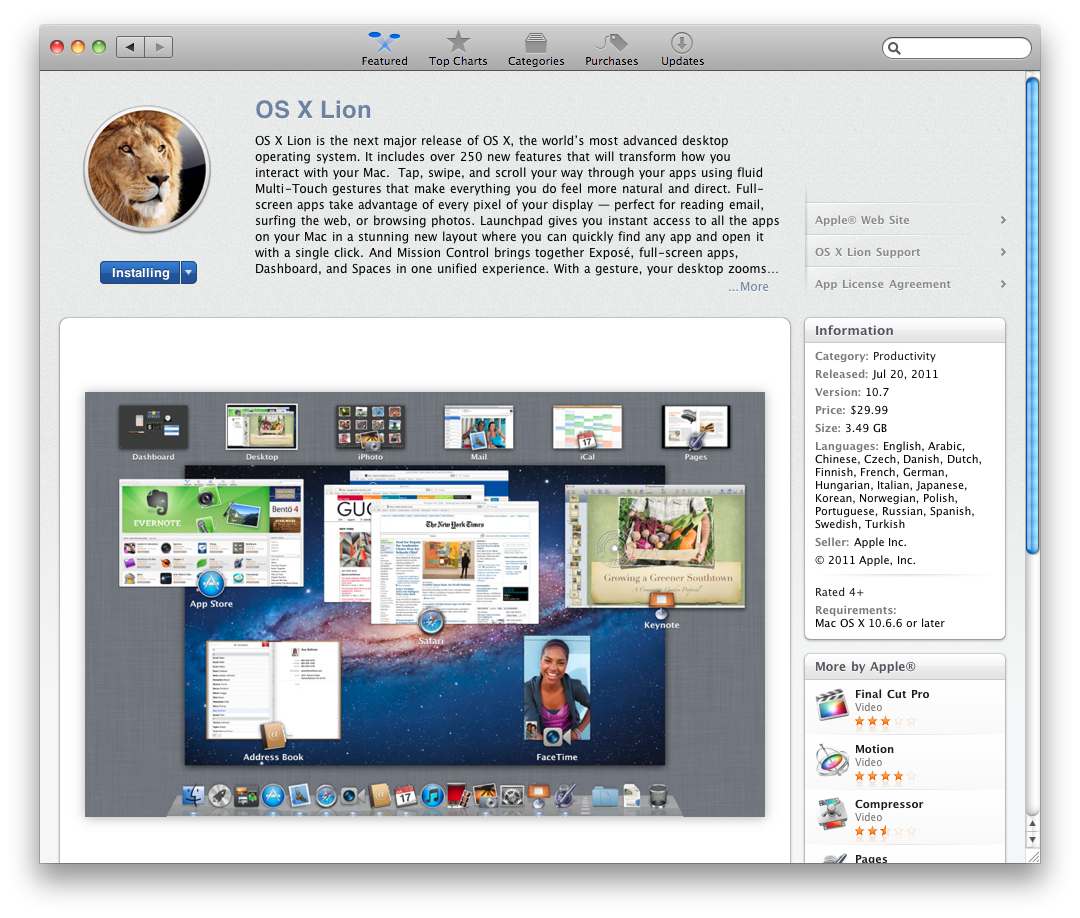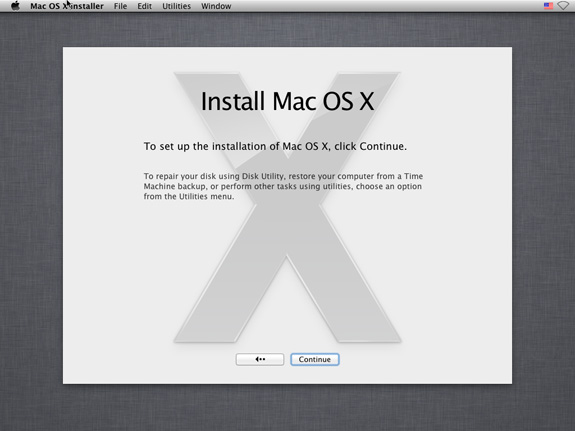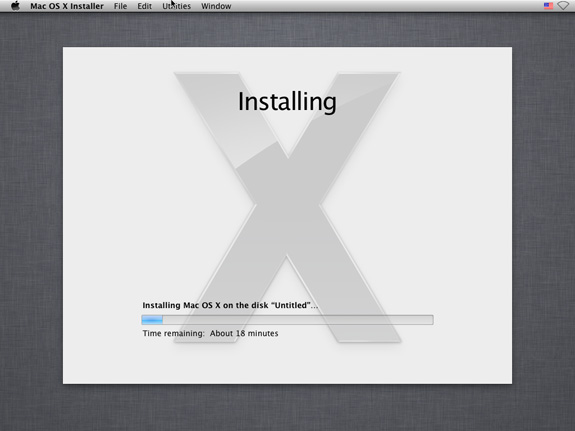Back to the Mac: OS X 10.7 Lion Review
by Andrew Cunningham, Kristian Vättö & Anand Lal Shimpi on July 20, 2011 8:30 AM ESTLion is, as has been well-publicized, not being offered in stores on any install media – to emphasize all of the shiny new imported-from-iOS features, users have to download and install it from the Mac App Store. That said, Lion will be eventually also be available on a USB drive for $69 if you still want a physical copy or don't want to back the installer image up to one yourself.
We’ll talk about the installer itself more below, but the main wildcard in the Lion install process is the roughly 4 GB download from Apple, which takes quite a bit of time over a fast connection (and will take the better part of a day on a slower DSL connection). I’m writing this before the fact, but I’m willing to bet that the load on Apple’s servers is making the wait even more irksome for Apple’s early adopters.
A 3.49 GB download is a big one, but it’s slimmed down significantly from the Snow Leopard installer (my standard 10.6.3 Snow Leopard DVD is about 7.3 GB in size). This isn’t the product of optimization on Apple’s part, but rather the effect that the download-only decision has had on the rest of the OS: many components that were previously bundled (whether by default or optionally), including print drivers and the Java runtime environment, are now downloaded on-demand. Whenever you install a program or device that needs to make use of one of these elements, Software Update pops up and prompts you to download and install it. This can be annoying (what do you mean I need to wait for a separate download before I can play Minecraft?!), but it seems reliable enough, and it does ensure that you’re using the most recent version of whatever component it is that you’re downloading. Other disk space savers include the removal of many older OS X wallpapers (some of which have been with the OS since its inception) and the decision to make the Windows support files for Bootcamp a separate download (as they already are for Macs without optical drives).
Annoyances aside, I do think the move away from physical media is the right one for Apple to make – it reduces cost, it enables them to drop optical disk drives from more of their computers going forward, and it brings greater parity to the OS X and iOS install processes, one of many steps that Lion takes toward the potential merging of the two operating systems.
For those of you who are attached to an install disk for one reason or another, accessing the .DMG file within the Lion installer and burning your own DVD is fairly trivial for even a moderately technical user. The installer, like other App Store downloads, is dropped in your Applications folder. Right-click (or CTRL-clicking, depending on your setup) the installer, click Show Package Contents, go into the Contents folder, then the SharedSupport folder, and burn the .dmg file you find here to a DVD (or copy it to a USB stick) with Disk Utility.
It’s not something every user will want to do, but advanced users or people who reinstall their OS often may want to take advantage of it (especially since Apple's official line, in the event that you need to reinstall OS X to a brand-new hard drive, is to first install Snow Leopard, and then install Lion). It should be noted that this is also the easiest, most convenient way to do a clean install of Lion, which is not offered as an option in the standard installer.
Once launched, the Lion installer will ask you some questions about setup, spend some time unpacking files to your hard drive, restart your computer, and then do the rest on its own - OS X’s in-place OS upgrades are usually a bit smoother and a bit easier to recommend than Windows’, though that can vary based on the amount and type of files on your hard disk and your specific configuration. I never ran into issues throughout my testing, but your mileage may vary.













106 Comments
View All Comments
parlour - Monday, July 25, 2011 - link
The revenue includes all the money that is payed to developers, music labels and media companies. Apple keeps no more than 30% (probably quite a bit less) of it.bwmccann - Wednesday, July 20, 2011 - link
Just started playing it a month ago and my entire family is hooked!ltcommanderdata - Wednesday, July 20, 2011 - link
I don't suppose you could compare OpenCL performance between Snow Leopard, Lion, and Windows 7? Given the increasing emphasis Apple is putting in OpenCL and the requirement for it in Final Cut Pro X and no doubt future iLife and pro apps, it'll be good to see how their latest implementation stacks up in performance rather than just feature-set (Lion bumps things to OpenCL 1.1 from 1.0 in Snow Leopard.)jensend - Wednesday, July 20, 2011 - link
The claim that GPL3 "prohibits inclusion in retail products" is an outright lie. It's not just an inaccuracy- there's no way anybody who was even slightly informed about these things would think that; the ability to sell the software is one of the basic freedoms the GPL has always been about protecting.It is true that Apple refuses to use GPL3 software. The only reason I can think of for this is that the GPL3 says that if you distribute software under the GPL3 you implicitly grant patent licenses to everybody for any patents you may have which cover the software. Apple's wish to use its portfolio of obvious and non-innovative patents as a weapon to destroy its competitors conflicts with this.
Confusador - Thursday, July 21, 2011 - link
Came here to say this and you've got it covered. This is an unusual case of blatantly false information on AT, you guys are usually much better informed than this.batmang - Wednesday, July 20, 2011 - link
I'm a little surprised that Anand didn't include any gaming benchmarks in this OS review just for simple comparison. Overall though, fantastic review and I'll certainly be upgrading to Lion in a week or so. I'm waiting to see if any oddball bugs arise before taking the plunge. Thanks for the review Anand.Kristian Vättö - Wednesday, July 20, 2011 - link
I think he was going to but didn't have time (we wanted to get this out right when Lion went live). I don't know about his plans but maybe he will update this with GPU performance or do a separate article about that.Gigantopithecus - Wednesday, July 20, 2011 - link
"Business customers can get Lion for $29.99 per copy in units of 20 or more, and educational institutions can buy it along with the latest iLife and iWork upgrades for $39 in quantities of 25 or higher. Especially when compared to Microsoft's complicated and expensive Windows licensing, these simple, low and clearly defined upgrade prices are extremely welcome."I can't speak for business customers, but pricing for higher ed institutions is extremely variable for MS software.
To wit, at the University of Wisconsin, our tech store offers zero discounts compared to retail on all Apple software, whereas both W7 Pro & Enterprise are $10 for one license and $25 for a fiver. At the University of Michigan, Apple OS software is similarly sold at retail with no discount, while W7 Pro is $19. Michigan State offers no discounts on both OS X and W7 vs retail. Indiana University sells OS X for retail & W7 for $20.
I'm not familiar with direct-from-Apple educational pricing, but if you go to actual universities' actual computer stores, MS software is sold at enormous discounts at 3 of the 4 Big Ten campuses I'm familiar with. Saying Apple offers lower OS pricing than MS to higher ed customers is flat out inaccurate.
mrd0 - Wednesday, July 20, 2011 - link
Same at Washburn University's School of Law...I purchased the full enterprise Office 7 and then 10 for $9.95, and Windows 7 for $29.95. Apple software is not discounted.SmCaudata - Wednesday, July 20, 2011 - link
Minnesota is Free to download or the cost of printed media ($8). This was when I was there at least.At Colorado both Windows and Office are also free to download. Before that (last year) they participated in the $29 usage option for office.
The fact is Windows/Office is really only expensive if you are building your own computers and installing your own OS. Even then you can get it rather cheap and the money you save more than makes up for the extra $50 Windows 7 runs over this. Also this only updates on SnowLeopard. If you didn't have that upgrade it will cost you more. Win7 upgrades back to XP, correct?